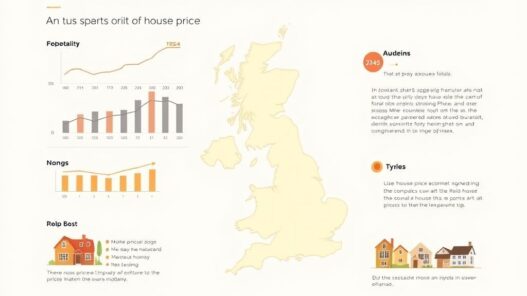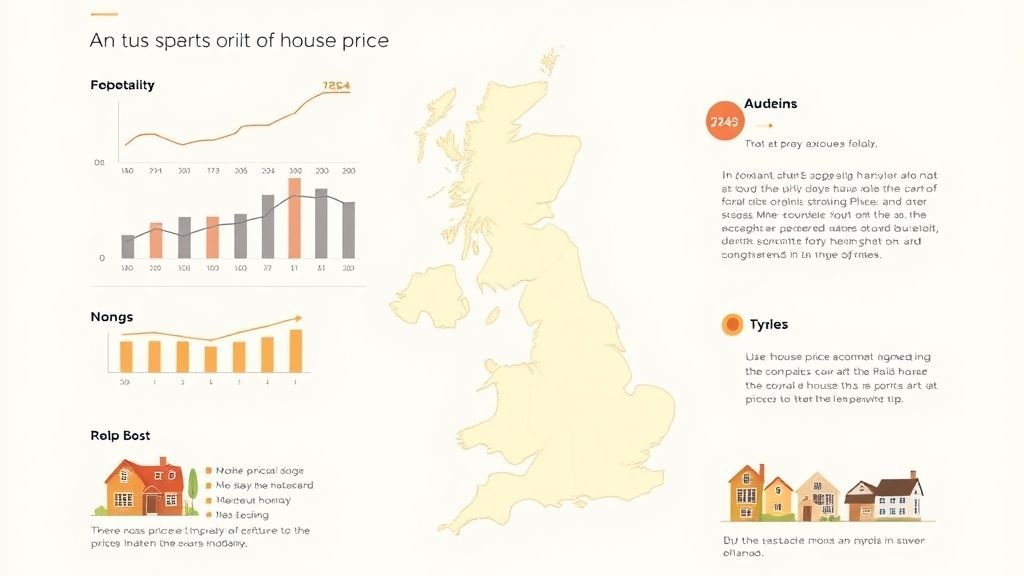Best Guide: Important UK House Prices – Proven Tips 2024
Introduction
Understanding UK house prices is crucial for everyone. Whether you are buying your first home or looking to invest, market knowledge is power. The property market in the UK is always changing. These changes affect millions of people. This guide offers proven tips for navigating the current landscape. We will explore key factors influencing house prices. You will learn how to make informed decisions. This information will help you succeed in 2024.
The UK housing market is complex. Many elements influence house prices. Economic stability plays a big role. Interest rates also have a major impact. Supply and demand dynamics are very important. Local factors can create big differences. This guide will break down these complexities. We aim to provide clear, actionable insights. You will gain a better understanding of the market. This knowledge is essential for any property venture.
Planning
Effective planning is vital for property success. You need to understand market trends. Researching specific areas is also important. Consider your financial situation carefully. This preparation helps you make smart choices. It reduces risks in a volatile market. Good planning sets the foundation for a successful purchase. It also helps if you are selling property.
Key Considerations
Here are five key things to think about:
- Economic Outlook: The broader economy affects house prices. A strong economy often means higher prices. A weaker economy can lead to price drops. Look at GDP growth and employment rates. These indicators provide valuable clues. They help predict future market movements.
- Interest Rates: Bank of England interest rates are very important. Higher rates make mortgages more expensive. This can reduce buyer demand. Lower rates make borrowing cheaper. This often boosts demand and house prices. Keep an eye on central bank announcements.
- Supply and Demand: The number of available homes matters greatly. If supply is low and demand is high, prices usually rise. If many homes are for sale but few buyers exist, prices may fall. New construction levels influence supply. Population growth affects demand.
- Government Policy: Government decisions can impact the market. Stamp Duty changes affect buying costs. Planning regulations influence new builds. Help-to-Buy schemes support first-time buyers. These policies can shift market dynamics. Stay informed about new legislation.
- Regional Variations: House prices vary significantly across the UK. London and the South East often have higher prices. Other regions might be more affordable. Local job markets and amenities play a role. Research specific areas you are interested in. Understand local market conditions.
Understanding these factors is crucial. They all contribute to the overall picture. Your decisions should reflect this knowledge. This proactive approach will serve you well. It helps you anticipate market shifts.
Cost Analysis
Analyzing costs is a critical step. You must understand all financial aspects. This includes the purchase price itself. It also covers additional fees and taxes. Mortgage costs are a major consideration. Legal fees and surveys add to the total. Being aware of these costs prevents surprises. It helps you budget effectively. A thorough cost analysis is essential.
Price Comparison
Comparing house prices across different regions is insightful. It highlights market disparities. This table shows average house prices in various UK regions. Data is for a typical three-bedroom semi-detached house. These figures are illustrative for 2024. They demonstrate regional differences.
| UK Region | Average House Price (2023) | Average House Price (2024 Est.) | Annual Change (%) |
|---|---|---|---|
| London | £520,000 | £515,000 | -1.0% |
| South East | £380,000 | £378,000 | -0.5% |
| North West | £230,000 | £235,000 | +2.2% |
| Scotland | £205,000 | £208,000 | +1.5% |
| Wales | £215,000 | £217,000 | +0.9% |
| West Midlands | £250,000 | £253,000 | +1.2% |
This table shows varied trends. Some regions saw slight decreases. Others experienced modest growth. London house prices show a small dip. The North West and Scotland show increases. These regional differences are important. They reflect local economic conditions. They also show local demand and supply. Always check current data for your specific area. This will give you the most accurate picture.
Step-by-Step Guide
Navigating the UK property market requires a clear plan. This guide provides detailed steps. Follow these instructions carefully. They will help you understand house prices. You can make informed decisions. This process applies whether you are buying or selling.
DIY Instructions
Here are detailed steps to help you:
1. Research the Market Thoroughly: Start by gathering information. Look at current house prices in your desired areas. Use reputable property websites. Check local estate agent listings. Read market reports and news articles. Understand recent sales data. This research forms your foundation. It helps you set realistic expectations.
2. Assess Your Financial Position: Understand what you can afford. Get a mortgage in principle. This shows how much a lender might offer. Factor in all associated costs. These include stamp duty, legal fees, and survey costs. Do not forget moving expenses. A clear budget is essential. It prevents overstretching your finances.
3. Identify Your Priorities: Decide what you need in a property. Consider location, size, and type of home. Think about schools, transport, and amenities. Make a list of your must-haves. Also, list your nice-to-haves. This helps narrow down your search. It saves time during viewings.
4. Engage with Professionals: Find a good estate agent. They can help you find suitable properties. A solicitor is crucial for legal work. Get recommendations from friends or family. Choose professionals you trust. They will guide you through the process. Their expertise is invaluable.
5. View Properties Actively: Visit many homes that fit your criteria. Pay attention to the condition of the property. Look at the surrounding area. Ask questions about the property’s history. Take notes during your visits. This helps you compare different options. It also gives you a feel for the market.
6. Make a Well-Informed Offer: Once you find a suitable property, make an offer. Base your offer on your research. Consider recent comparable sales. Be prepared to negotiate. Your estate agent can advise you. A fair offer is key to success.
7. Secure Your Mortgage: After an offer is accepted, finalize your mortgage. Provide all necessary documents to your lender. They will conduct their checks. This process can take some time. Stay in close communication with your lender.
8. Complete Legal Due Diligence: Your solicitor will handle legal checks. They will review contracts and property deeds. They will conduct local authority searches. This ensures there are no hidden issues. Ask your solicitor any questions you have. This step protects your investment.
9. Arrange a Property Survey: Get a professional survey done. This identifies any structural problems. It can reveal hidden defects. The survey report helps you make a final decision. It might also give you leverage for price negotiation. Do not skip this important step.
10. Exchange Contracts and Complete: Exchange of contracts makes the sale legally binding. A completion date is then set. On completion day, funds are transferred. You receive the keys to your new home. This marks the end of the buying process. Congratulations on your new property.
Following these steps systematically helps. It makes the complex process manageable. You will feel more confident. Understanding UK house prices is a journey. These steps guide you through it.
Maintenance Tips
Understanding house prices is an ongoing task. The market constantly evolves. Staying informed helps protect your investment. It also prepares you for future decisions. Long-term care for your property involves more than just repairs. It means maintaining financial health. It also means staying aware of market changes.
Long-Term Care
Here are five tips for long-term property care:
- Monitor Market Trends Regularly: Keep an eye on house prices. Read property news and market reports. Understand economic forecasts. This helps you gauge your property’s value. It also informs potential future moves. Stay updated on UK house prices.
- Review Your Mortgage Periodically: Interest rates change over time. Your financial situation also changes. Review your mortgage deal every few years. You might find a better rate. Remortgaging can save you money. It can also reduce your monthly payments.
- Invest in Property Improvements Wisely: Smart renovations can add value. Focus on improvements that appeal to buyers. Kitchens and bathrooms often offer good returns. Energy efficiency upgrades are also popular. Avoid over-improving for your area. This helps maintain your property’s value.
- Build an Emergency Fund: Unexpected costs can arise. Boilers break down. Roofs might need repairs. Having savings prevents financial stress. It ensures you can maintain your home. This protects your investment in the long run.
- Consider Professional Valuations: Get a professional valuation occasionally. This gives you an accurate picture of your property’s worth. It is useful for insurance purposes. It also helps if you plan to sell. Understanding your current equity is important.
These tips help you manage your property. They also help you manage your finances. A proactive approach is always best. It ensures your property remains a valuable asset. It also helps you adapt to changes in UK house prices.
Conclusion
Understanding UK house prices is essential for everyone. The market is dynamic and complex. This guide has provided a comprehensive overview. We covered planning, cost analysis, and practical steps. We also discussed long-term maintenance tips. Remember to research thoroughly. Always assess your financial situation. Engage with trusted professionals. Stay informed about market trends. These actions empower you to make smart decisions. The UK property market offers opportunities. With the right knowledge, you can navigate it successfully. Your journey in property ownership will be more secure.




















